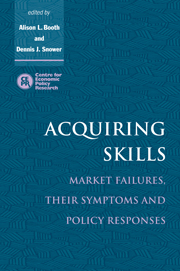Book contents
- Frontmatter
- Contents
- List of figures
- List of tables
- Preface
- List of contributors
- 1 Introduction: does the free market produce enough skills?
- Part I Market Failures: The Causes Of Skills Gaps
- 2 Transferable training and poaching externalities
- 3 Credit constraints, investment externalities and growth
- 4 Education and matching externalities
- 5 Dynamic competition for market share and the failure of the market for skilled labour
- 6 The low-skill, bad-job trap
- Part II Empirical Consequences Of Skills Gaps
- Part III Government failures and policy issues
- Index
4 - Education and matching externalities
Published online by Cambridge University Press: 16 November 2009
- Frontmatter
- Contents
- List of figures
- List of tables
- Preface
- List of contributors
- 1 Introduction: does the free market produce enough skills?
- Part I Market Failures: The Causes Of Skills Gaps
- 2 Transferable training and poaching externalities
- 3 Credit constraints, investment externalities and growth
- 4 Education and matching externalities
- 5 Dynamic competition for market share and the failure of the market for skilled labour
- 6 The low-skill, bad-job trap
- Part II Empirical Consequences Of Skills Gaps
- Part III Government failures and policy issues
- Index
Summary
As noted in the Introduction (Chapter I), the free market fails to provide adequate incentives for training when the people who pay for the training cannot appropriate all the resulting benefits. This chapter shows that when workers who want jobs are not certain of getting job offers and when firms with vacancies are not certain of getting job applicants, a person who acquires training confers benefits on those who do not have to bear the training expenses. In particular, the more workers acquire training, the faster firms can expect to attract skilled workers and the more favourable will their outside opportunities in wage negotiations be (specifically, the lower the wage the firm can expect to achieve with potential substitutes for the skilled workers they are currently negotiating with). This raises firms' market power in wage negotiations and reduces workers' returns from training. The resulting ‘matching externality’ can lead to underinvestment in skills.
Introduction
Human capital theory provides a theory of the demand for education. This approach sets out a standard investment problem in which individuals acquire education until the expected returns from an additional year equal the expected costs; that is, investment in training depends upon the benefits from higher lifetime earnings arising from increased skill levels. Moreover, this approach allows us to calculate simple comparative statics. For example, if a subsidy reduces the cost of education, then holding all other prices constant, it is a well-known result that workers will want to become more educated.
Yet, while it is useful to understand the optimization problem of a single agent, it is also necessary to consider the subsequent interaction with the labour market.
- Type
- Chapter
- Information
- Acquiring SkillsMarket Failures, their Symptoms and Policy Responses, pp. 63 - 80Publisher: Cambridge University PressPrint publication year: 1996
- 5
- Cited by



